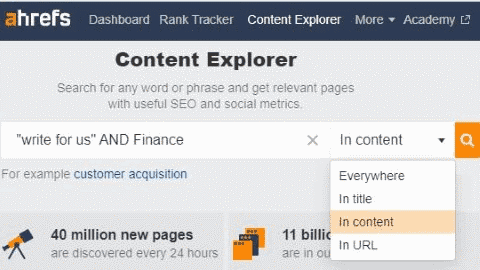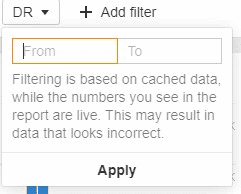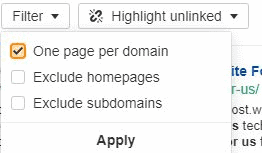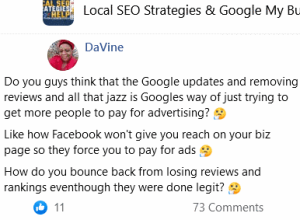01707Vijay
How to find a suitable site for guest publications and link building using Advanced techniques.👨💻
This post👇 is for you if you really want to get your guest posts published or do link-building with sites. But don't know how to find the right sites to outreach?
Ahrefs is the only SEO tool that you need to know about for this!🔧
✔ Simply go to Ahrefs "content explorer".
✔ Enter a query in the search box based on what you are looking for, two different ways of adding the query can be.
✔ Write for us AND (niche related keyword). Ie. write for us AND Finance.
✔ Search the Author name who writes in your niche, look for the sites with his published content.
✔ Add a filter that you want to search for keyword everywhere/ in content/ in URL or in the title.
✔ Add Filters like minimum DR and web traffic of a site, you can also filter the content based on language and live or broken links. Cool right?.
✔ Add the final filter " One Page per domain" this filter will not bring the same domain more than one time in results.
✔ Search the results and analyze the site.
✔ Make the list of sites that you want to outreach or simply download the list.
✔ Find the contacts and pitch an email.
🤔In case you do not have Ahrefs you can simply use Google search engine to find the suitable site by just modifying your query input!.
✔ Search in Google with query inurl:write for us + intext:(keyword).
✔ Check the results, analyze the sites and make the list.
✔ Find the contacts and pitch an email to right person only.
Disclaimer – Please filter out the Spamy sites.
18 👍🏽1 💟
15 💬🗨



This works, but the links you get tend to be very much on the lower end of quality, especially since you are focusing on Domain score, rather than page scores.
The problems are several.
First, this is a widely known technique that has been shared many times over the decades, and I do mean decades. Back when there was an actual PageRank score for pages that you could see in a toolbar it was pretty reliable. The modern link analysis tools ought to make it even easier, but people look at the wrong metrics, and the tools don't make it particularly easy to find what actual page value, divided by total number of links, still applies when a page is a few months old.
That brings us to problem number 2. The site is openly inviting guest posting. Easy for Google to know and apply extra scrutiny or extra levels of filtering to. But worse, because it is openly inviting writing, you know they are looking at volume – they just want content to slap ads onto and to. So your submission will likely be one of hundreds in the next few months, and the link TO your article on their own site will quickly be buried in the archived content, meaning the share of that domain linkage going to your article, out of the thousands, is *pathetically* tiny.
Pro Tip: The best 'guest writing' opportunities are where you can write for a site that is very selective, doesn't advertise for writers, and the best of all is if they normally wouldn't accept guest articles at all, but make an exception for your (writer's) expertise and experience.
Check the actual Page Values of guest posts you made 2-3 months ago, which isn't long at all. Divide by the number of links on the page, including navigation menus etc – ALL links. The result is what your link there is actually worth, maybe, if not discounted in some way by Google. Bet that's not a number you want to boast about, right?
Idiots tell idiots about Domain level values because the numbers are bigger (but have absolutely no bearing on what a link is worth). You don't want to be either of those idiots.
The third problem is economics. There are certain types of sites that rely 100% on guest posts and built links. The sites that simply have no other options have to focus on this 100%. So spam, malware, and just really cruddy sites, are the sites who exemplify this kind of link building. And Google is all about pattern recognition.
There's a near 100% certainty that a spam-laden, utterly toxic site has, at some point, done the exact same technique of looking for places they can post to get links and found the same sites. If their link went live, then at the very least you are building a pattern of getting links from the same sources that link to a lot of spam. At worst, the site has allowed just enough of those bad links through to either have lost the ability to pass any link value at all – think of it like a Disavow that Google apply by algorithm – or even treat links from that site as a probability signal of spam and link schemes.
I'm not saying this technique doesn't work, but I would absolutely say that for the time investment this is about 1% as effective as actually finding just ONE high-value place to host an article. You'll get more actual PageRank from being much much more selective about going for exclusive, high value links any one of which are worth literally thousands of these low-end ones.
Thank you for the detailed analysis and wise words. Really appreciate you taking out the time for this. 🙂 And I agree to the points you made. I get the point that we should focus on getting high quality links based on page rank and not domain rankings. Domain Rating (DR) can be misleading at times. Hence I specifically mentioned that you can filter out the domains based on 2 diff metrics, DR + Traffic. And of course with this technique you find a lot of SPAM sites which accept paid Guest Posting (GP)'s but still there are a lot of good sites too there which accept the GP's for your knowledge and expertise. There are so many ways with which we can do link building. This is just one of the techniques that is commonly accepted.
Milli » Ammon
Really great insights. I have a couple of questions if I may:
(1). What do you consider low value? Do you have a set of numbers that you go by?
(2). For a new site, to build some kind of profile before going for the high value links, do you not need to do the lower value links?
(3). In regards to page vs domain value. How would you know what the value of your guest blog page before-hand? Or do you go by what the page structure in the URL is? ie.
website.com/blogAmmon 🎓🎩 » Milli
Great questions.
1. Value applies in almost every possible way. In terms of tool stats it would be the Page Level values of the tool that reflected one aspect of this, as this is the actual closest that tool will get to an actual estimate of PageRank the metric that Google use. (Google do not have a domain value at all). In terms of Search Engine Optimization (SEO), I am also talking about the actual PageRank scores, even though Google hide them and I can only estimate, for Google they are very real numbers. Domain level scores are never real numbers to Google because they simply don't have them. The only things Google ever calculate at a domain level are penalties or filters. Google rank pages, not sites.
2. It depends. Yes, I know, but you asked a question where that is the only true answer. A high value link is generally earned, and thus you need to have something that earned it. If you had a client that invented the world's first actually usable fusion reactor, mega news, do you think the Times, NYT, and other major news sources would say "We're not covering that until a load of blogs have done so!"? The 'earning' is that they have something worthy of a link – they built a working fusion reactor. To get featured as a topic expert in those same news publications though is going to take track record most of the time, and often contacts too. Proving expertise and the ability to explain yourself well for a news site would probably need some other citations. But if you'd written books instead of articles, and those had done well, is that really classed as 'lower value'? I wouldn't describe it as such.
3. PageRank is the passable page-level value of a page, divided (not entirely evenly, but not completely far off either) by all links on that page.
If a page, by which I mean a specific URL in Google's link index, has a value of 50, and it has 50 total links on it (navigation, header, content and footer, all of it) then each link is effectively getting 1:50, or a value of 1. If it had 100 links in total, each link is worth half as much, even though the page itself has the same value. If it had only 20 links, each would be passing 2.5 units of the value.
This isn't precise, but a very simplified example that is 'close enough', without having to get into too much guesswork about page segmentation weighting, or damping factors.
For a page that doesn't exist yet, just look at how it will be linked, find an existing page that is linked in that exact way, and it will be close enough that, minus that both will be a tiny fraction less.
i.e. If a page with 30 links to other pages in the domain or section now has 31 links then each of the old links lost a fraction that now passes to the new added link.
Ayaz » Ammon
these are gems! I have a question, if we want to calculate PageRank with the number of links on a page and if there are lot of URLs on a page that means the more the URLs the lesser the value of the link. How do we determine links for each page? Let's say I want to publish a blog on my site how many links do you think are valuable?
Ammon 🎓🎩 » Ayaz
If you are talking about your own page on your own site, then it is a non-issue because ALL of the links are going to your pages, at least as far as navigation and cross-links.
If that's not what you're talking about, you'll need to rephrase your question with a little more precision and detail about what you mean.
Ray
For a couple of years, I openly invited guest contributors to write for my site. I made it clear on my site that I didn't accept payment, but I did have extremely high standards for the content I was willing to publish.
In two years, I literally got hundreds of inquiries. I was only able to publish a single post. Many of the people who inquired argued with me. They were willing to send me money, but they weren't willing (and/or able) to provide me with a high quality guest post.
Backlinks for Content with Skyscraper Technique Case Study
16 Months of Buying Links: What I learned, and What to Avoid





